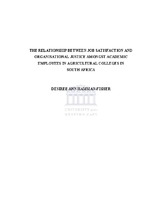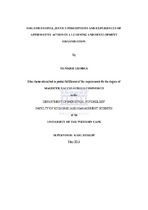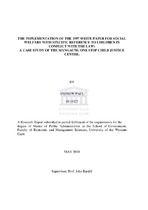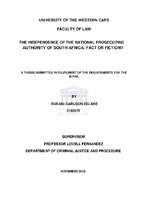The relationship between job satisfaction and organisational justice among academic employees in agricultural colleges in South Africa
Abstract
In an attempt to make South Africa a more just society after the first democratic elections on 27 April 1994, the South African society had to undergo a number of radical changes which impacted the social, economical, political and educational arena. These changes have influenced recruitment, retention and turnover. Changes at leadership levels in the private and public sphere coupled with a huge exodus of highly skilled professionals are evident as topics of equality and social justice appear at the top of company agendas. Many proponents have conducted research on organisational justice and the fact that more than twenty five thousand articles have been published on job satisfaction attest to the importance of these two variables on organisational performance. In an article examining past, present and future states of organisational justice it is argued that organisational justice has the potential to explain many organisational behavioural outcome variables. An investigation of the relationship between organisational justice perceptions and work behavior found job satisfaction to be made up of a large fairness component. The rationale behind the support for the study is the argument that employees who perceive that they have been fairly treated is likely to hold positive attitudes about their work, their work outcomes and their managers. If South African organisations wish to remain competitive then organisations need to understand how perceptions of justice influence attitudes and behaviour and consequently affect the success of the organisation. Agricultural Colleges, a division of the Department of Agriculture are no exception. The Agricultural Colleges' primary aim is to provide training to its prospective communities, and is continuously being evaluated in terms of how well its academic employees achieve its vision, mission and goals. It is evident from responses to job advertisements, low morale and high turnover that most of the academic employees in Agricultural Colleges are dissatisfied with their jobs, pay, management and the institutions based on their current salary. Attracting, recruiting and retraining highly skilled, internationally marketable and mobile employees are critical factors in determining the present and future success in agricultural training in South Africa. Limited research to examine the effects of organisational justice on organisational outcomes in an environment where the workforce consists of academics is the gap this research attempts to fill. This study is designed to assess the impact of organisational justice on job satisfaction of academic employees in agricultural colleges in South Africa. Also, to determine whether biographical values influence the relationship between organisational justice and job satisfaction.
Collections
Related items
Showing items related by title, author, creator and subject.
-
A study of investigating organisational justice perceptions and experiences of affirmative action in a learning and development organisation
George, Munique (University of the Western Cape, 2011)There have been good arguments made for the development of aggressive affirmative action policies with the end goal of quickly moving black South Africans into corporate and high ranks within management of organisations. ... -
The implementation of the 1997 white paper for social welfare with specific reference to children in conflict with the law: a case study of the mangaung one stop child justice centre
Paul, Andrew (2010)Whilst policy formulation has been extensively studied and theorised in the literature, far less attention has been paid until fairly recently to the issue of policy implementation. For a long time it was more or less ... -
The independence of the national prosecuting authority of South Africa : fact or fiction?
Selabe, Busani Carlson (University of the Western Cape, 2015)The National Prosecuting Authority (NPA) is critical in the proper functioning of South Africa’s criminal justice system and upholding of the rule of law. And for it to play this critical role it must be independent from ...




